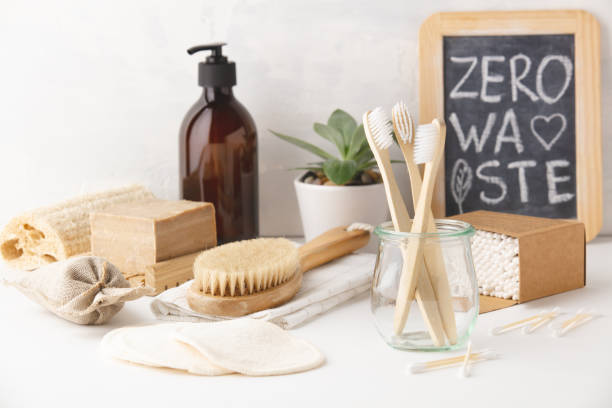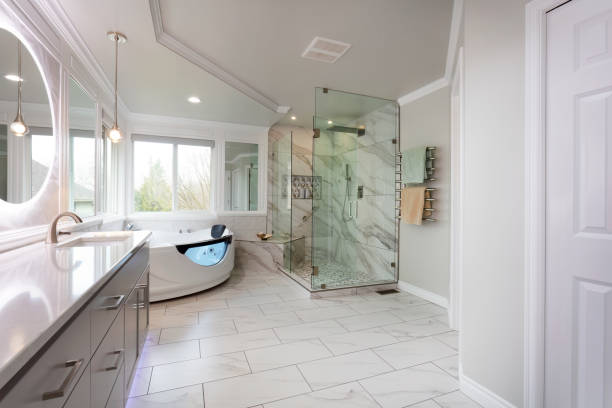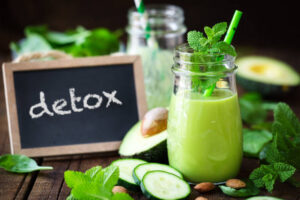If you’ve been considering going zero waste, one of the best places to start might be your bathroom.
Household waste is mostly generated in the bathroom. Most bathroom products are made to be thrown away, from plastic shampoo bottles to disposable razors to flimsy toothbrushes. Don’t buy single-use products that are harmful or toxic.
It is quite fun to transition to a zero waste bathroom, though it will require some time and mindfulness. In addition to cleaning out your cabinets and drawers, you can reassess all of your products and replace them with healthier alternatives. You can also reduce your carbon footprint and declutter.
Successful Tips to Create a Zero Waste Bathroom

1. Replace almost everything with bamboo products
A bamboo eco-swap could just be the silver bullet you need to have a zero waste bathroom! Fast-growing bamboo is one of the world’s most sustainable plants. Find bamboo alternatives for these products:
- Toothbrush
As bamboo toothbrushes are made of natural fibers, they can decompose safely, and they can even be composted after use! Comparatively, a plastic toothbrush will decompose in over 400 years! Bamboo products are available in a wide variety of styles and can even be more affordable than plastic alternatives. Our lives are so much better since we switched.
- Floss
Plastic packaging is used to package most floss sold in stores. On the other hand, zero waste floss is made from natural ingredients and packaged in recyclable glass. Bamboo floss is an example of zero-waste floss type. By removing plaque and brightening our teeth, bamboo charcoal dental floss helps keep our teeth healthy. Unlike traditional eco-friendly floss made from maize fiber or silk, bamboo floss is much stronger. Silk floss is another zero waste floss. In addition to being natural, it is mild on gums and friendly to the environment.
- Toilet paper
The loo is also a great place to switch to bamboo products! We love bamboo toilet paper as an eco-friendly alternative. That’s quite a change from recycled toilet paper in the 1990s! No one will be able to tell a difference. Most people prefer the eco version.
- Cotton buds
Thousands of people have been inspired to reconsider their use of plastic cotton buds after seeing the picture of the seahorse carrying one. Instead of cotton swabs, try bamboo alternatives.
- Toothpaste
There are two types of zero-waste toothpaste: tablets and powders. This toothpaste comes in recyclable glass jars instead of plastic containers. A toothpaste tablet and a toothpaste powder are both forms of toothpaste in a more concentrated form. They are convenient to store and travel with, as well as easy to use. There will be no leaks or messes since toothpaste tablets and powders have been dehydrated.
- Soap containers
Bamboo soap dishes might also be a good addition to the bathroom. These bamboo products can help us achieve zero waste bathrooms. Our soap dishes allow us to dry our soap between uses, which prevents it from dissolving in water puddles. The goal is to ensure our soap bar lasts as long as possible if we use it. A zero waste bathroom dish container is a great way to display an elegant, pleasant-smelling soap bar.
- Hairbrush
Ever wondered if running metal or plastic through your hair is bad for you?
It is! A bamboo hairbrush is not only better for the planet but also for your hair. There are no pins on bamboo bristles which tangle your hair. Invest in a plastic-free, sustainable hairbrush! Instead of plastic, they are made from bamboo, which is just as effective.
2. Switch to shampoo and conditioner bars
The average bottle of shampoo contains 80% water! Because shampoo bars are concentrated, they last twice as long as standard bottles of shampoo (saving two plastic bottles). Traveling with them is also easy. This swap is well worth considering based on those stats. You can find several sustainable options in zero waste stores.
Our bodies and minds feel better when they are treated with essential oils, which come in many shampoo and conditioner bars. Lavender essential oils are known to calm and relax the body, while citrus essential oils energize and awaken the mind. Natural ingredients also contribute to the health, shine, and condition of our hair.
3. Avoid plastics
There is one rule to follow. Replace your old plastic-based items with bamboo alternatives when they wear out (don’t throw them away prematurely). Their packaging is 100% biodegradable, and they last between three and five months. Also, wooden hair brushes and combs are durable and do not create static electricity in the hair.
Plastic is also used in shower sponges. Try buying a natural product next time you need one, like a bamboo toothbrush, a loofah, or a plant fiber brush.
The use of razors is also a major pollutant. An average man uses 52 disposable razors every year. What can be done? Razors made from steel can be used. You’ll only generate waste from the razor itself throughout a lifetime.
Read more: Reducing Plastic Waste: 20 Sustainable Alternatives to Single-Use Plastics
4. Get rid of containers
Avoid packaging whenever possible if you want a zero-waste bathroom. Increasingly, liquid soaps are being sold in bulk or solid form in specialized shops. You just have to find the right soap for you at sustainable zero waste stores, and you won’t have to worry about dandruff, dryness, oily skin, dullness, or lack of shine.
You might be surprised to learn that a bar of soap lasts as long as six times as long as a bottle of liquid soap.
Read More: 10 Good Benefits of Shopping at Zero Waste Stores
5. Prepare your own shower/shave gel
In addition to health and environmental concerns, aerosol shaving cream and gel cans pose several other risks. Besides being tricky to recycle, aerosols emit volatile organic compounds (VOCs), which are harmful to both our health and the environment.
Since aerosols contain microplastics, they are bad for the environment. In oceans, water systems, and landfills, these tiny particles harm marine life because they do not biodegrade. You can avoid these potentially harmful ingredients by making your own shaving gel or shower gel with natural ingredients like aloe vera gel or coconut oil, along with essential oils.
6. Wave goodbye to single-use products
In addition to being environmentally hazardous, single-use products can also be expensive for consumers. These products are not only wasteful but also contain materials like plastic and aluminum that do not biodegrade easily.
When they break down, they release toxins into the air and water, contaminating both human and environmental health. Fortunately, it is possible to reduce the number of items one uses in the bathroom that are single-use. The best way to remove makeup is with washable cotton pads and bamboo toothbrushes.
When these items are used, they can be cleaned with soap and hot water and are meant to last longer than single-use ones. Many companies offer refillable bottles of bathroom items, such as shampoo or body wash. This can significantly cut the amount of plastic used each month.
We will also be protecting our environment from further damage while preventing harmful materials from entering our waste stream in the long run.
7. Declutter
Decluttering your bathroom is a good place to start to achieve a zero waste bathroom. You should take inventory of everything you own and keep only the things that matter to you. Beauty products that are still usable should not be thrown away. Dispose of them as soon as possible after finishing them.
When you have expired products that cannot be used anymore, make sure to sort them out and dispose of them properly by recycling or reusing containers. Bulk shampoo or liquids can be stored and dispensed in old plastic bottles.
Whenever possible, donate everything that still works, including straightening irons and blow dryers. At a scrap metal recycling center, broken hairdryers can be recycled as scrap metal. You can look up how to dispose of something online if you are unsure.
Also, consider reducing the number of things in your home as part of achieving a zero waste lifestyle; so declutter duplicates and things you don’t regularly use. As a result, your drawers, and other storage areas will look cleaner and have enough room for extra towels, decor, and other zero waste bathroom supplies.
You will feel a lot better once you have completed this process. Also, you will learn a lot that will help you in other areas of your zero waste journey. When possible, find package-free alternatives where needed and stick with the essentials.
8. Go natural with soap bars
You can transform your bathroom into a sustainable sanctuary and save so much when you ditch the plastic bottles of body wash and switch to old-fashioned bar soap. Without the nasty chemicals of some commercial soaps, soap bars are likely to be better for your skin as well and they are available in many sustainable brands. Remember these tips as you shop in zero waste stores.
Natural soap is made from pure, earth-friendly ingredients, a testament to simplicity in a world awash with chemicals. In addition to cleansing and nourishing your skin, each lather is enriched with organic oils and extracts.
Natural soaps are biodegradable and gentle on both your body and the environment, unlike conventional soaps which contain harsh surfactants and synthetic fragrances. Choosing natural soap contributes to a cleaner, greener future, not just a product choice. The goal is to have a zero-waste bathroom where all actions and products follow nature’s rhythms, reducing our carbon footprint along the way.
9. Deodorant
There are several options out there. How will you choose between them? Let’s begin by discussing antiperspirants that work by using aluminum. Your sweat glands are blocked by aluminum, so you do not sweat. Keeping your body from sweating and releasing bacteria and toxins is not healthy.
Moreover, antiperspirant products can disrupt your endocrine system and irritate your skin with parabens and synthetic fragrances. By neutralizing odors and removing bacteria, all-natural deodorants are much better for your health (and the environment).
Natural deodorants are safe to use on your skin and leave you smelling fresh. Underarm detoxes are recommended before switching to help your pits adjust. You will find a variety of options when it comes to zero-waste deodorants. Some are refillable, some come in biodegradable tubes, some use recyclable glass, and others have formulas that are gentle on your skin.
10. Menstrual cups
Tampons are probably something you haven’t thought too much about. The cotton used in tampons is one of the world’s most highly treated crops. So, once the tampon is inserted, you are absorbing all of the glyphosate, herbicides, and pesticides that were sprayed on non-organic cotton.
Women can become ill as a result of these problems, especially as they age, due to developmental, neurological, reproductive, and/or immunological problems. Tampon use also carries a risk of TSS. There is also evidence that glyphosate may cause cancer. Menstrual products manufacturers aren’t required to disclose the ingredients in their products!
Choosing the right cup is the most stressful part!
It is important to know that every person is unique, but there are plenty of videos available to guide you to the best method for you. Even if you’re not a fan, you can also use reusable cloth pads or period panties for your nighttime period routine if you give it a try.
11. Shower curtains
Remember your shower curtain! Most people have a PVC shower curtain in their bathrooms. Over 100 chemical compounds are released into the air from these traditional shower curtains! There are several ways in which these can negatively affect your health.
Also, it is impossible to recycle them, and many don’t last that long before becoming shabby. Shower curtains made from eco-friendly materials can save the day and help you achieve a zero waste bathroom! Aside from being free of hazardous chemicals, recyclable, and often compostable, they also look great in bathrooms!
12. Reusable facial rounds
It is common to find pesticides and herbicides in store-bought cotton rounds. The cost of replacing them is high as these are single-use products. Using reusable facial rounds is great for many reasons, including their long lifespan, ability to be thrown into the washer, ability to last just as long, ability to save money, and environmental friendliness.
A variety of materials can be used to make them, including bamboo and organic cotton sourced sustainably, or you can make them yourself with an old flannel shirt! Switching to reusable facial rounds is a great step in having a zero waste bathroom.
13. Zero waste cleaning supplies
Many household cleaners contain harmful chemicals that may work but aren’t very eco-friendly. A great way to go is to choose eco-friendly cleaning products. While cleaning your bathroom, follow these zero waste cleaning tips. There are a few zero waste bathroom supplies that you need, a few homemade zero waste supplies you can make, and some adjustments you need to make.
It’s much easier than you might think to switch to biodegradable sponges and brushes or rags instead of paper towels. Here are some DIY cleaning recipes you can use instead of chemical-filled products, which do a great job too… for a fraction of the cost!
14. An all-steel razor
They sound (and look) intimidating, so most people are wary of switching. The truth is, they aren’t! The flexible heads provide a close, clean shave, and they are very forgiving. You should be able to use them for the rest of your life, but if you need to replace one, you can easily recycle it. There are countless videos online that show you how to use one if you’re nervous about it. Both men and women can benefit from them. This one is awesome!
15. Reduce as much as possible
In terms of sustainability, makeup removal wipes and discs pose a major threat. To attain a zero waste bathroom, you can also use washable discs or microfiber towels instead. Once you’ve removed your make-up with them, they’ll look as good as new with some hot water and soap. It’s also possible to wash them if you want.
Why a Zero Waste Bathroom Matters

A zero waste bathroom can have a significant impact on the environment. Taking steps to lower pollution, reduce greenhouse gas emissions, and eliminate plastic pollution in our oceans can be accomplished by reducing our demand for certain products and materials.
As well as being mindful of what we bring into and throw away from our homes, we can contribute to a healthier environment. The practice of zero waste reduces energy consumption, reduces toxic chemicals in landfills and water sources, conserves resources, and increases wildlife habitats when it is practiced correctly and consistently.
Because they often require fewer materials and labor, zero waste bathroom practices are often more cost-effective than traditional methods. In addition to reducing global warming, we can reduce it by reusing products and composting food scraps.
Final Thoughts
This should cover all of the essentials for you to start building a zero waste bathroom. Do not get discouraged if you don’t get it right off the bat since this may take some time to get used to.
The majority of zero wasters have at least one-pint jar of plastic and non-compostable items in their homes. Do your best and stay focused on what you can accomplish. Whenever possible, choose zero waste alternatives to help reduce waste. Please share this article if you found it helpful – sharing is caring!
FAQs:
How do I transition to a zero waste bathroom?
To transition to a zero waste bathroom, you must evaluate what you currently have. Start replacing disposable items with sustainable alternatives as soon as possible. Change to bamboo toothbrushes, soap bars, and shampoo bars, for instance. Making gradual changes is the key, and taking small steps towards reducing waste is perfectly okay.
Are there zero waste alternatives for common bathroom products?
Yes, there are zero waste bathroom alternatives! Plastic toothbrushes can be replaced with bamboo ones, liquid soaps in plastic bottles can be replaced with bar soaps in place of liquid soaps, and shampoo bars can replace liquid shampoos. Sustainable alternatives to disposable menstrual products include cups and cloth pads. Use reusable cloth towels instead of paper towels and replace disposable razors with safety razors. These swaps tend to be more cost-effective over time.
How expensive is switching to a zero waste bathroom?
Even though zero-waste products may require a higher initial investment, they can end up being more economical over time. A long-lasting product like safety razors or menstrual cups can save you money in the long run, compared to disposable products. In addition, reducing frequent purchases will not only save you money but will reduce the amount of waste generated as well.
What is the best way to handle bathroom waste?
It is important to dispose of waste mindfully in a zero waste bathroom. The bristles of bamboo toothbrushes, cotton swabs with paper stems, and cotton swabs with cotton stems can be composted. Reduce the amount of waste generated by recycling recyclable materials. In addition to minimizing your environmental impact, this approach adheres to sustainable living principles.
Is it possible to have a zero waste bathroom with a large family?
Yes, it is necessary to educate and involve all family members in sustainable practices to maintain a zero-waste bathroom. Make sure your product caters to everyone’s needs and is easy to use. Make it a habit to turn off the tap when you brush your teeth and to use towels efficiently. By incorporating these practices as a family, waste can be significantly reduced and a sustainable lifestyle can be promoted.







